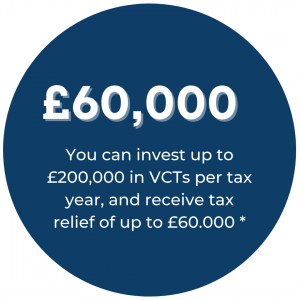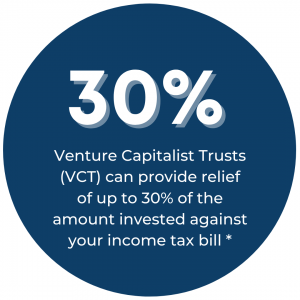Everyone’s heard of the football season. August saw the season kick off with a bang, and it’s been great to see crowds back in the stands after a strange 18 months or so.
On the other hand, a lot of people won’t have heard of VCT season, or VCTs for that matter!
So what is a VCT?
The government introduced Venture Capital Trusts (VCTs) as a way of encouraging investment into Britain’s exciting entrepreneurial businesses.
The UK is one of the world’s most successful markets for entrepreneurial small companies. But companies that start small often need investment capital to help them grow and develop.
Recognising that investing in such companies involves taking more risk than investing in larger more established companies (for example, HSBC or Vodafone). The Government created VCTs as a way to provide investors with an easy way to access these small, unlisted or AIM-listed companies in exchange for a number of tax reliefs.
What tax reliefs are available?
- Up to 30% upfront income tax relief on up to £200,000 a year. (You must keep VCT shares for 5 years to keep income tax relief)
- Tax-free dividends
- An exemption from capital gains tax on the shares should they rise in value
The VCT Season
The football season isn’t the only thing to have kicked off with a bang. Each year in late summer, we also see the opening of the VCT season, with VCT’s opening up for fundraising.
The Season certainly got off to a flying start with the Amati AIM VCT, the first to launch an offer in the current tax year, raising its £40m fundraising target in just four working days!
 Why should I care?
Why should I care?
The last few years have seen a number of tax changes that have seen buy-to-let properties become less attractive. Not only this, but the tax-free dividend allowance has been reduced from £5,000 to £2,000 a year.
Now the Government has announced a 1.25% increase in dividend tax from next year, so the start of the VCT season could be a timely one if we see an increase in demand for tax-efficient investments.
Also, if you are a high earner – over £240,000 a year – the annual allowance for pension contributions is reduced and can be as low as £4,000 a year for some.
Who are they suitable for?
Of course, VCTs are not for the faint-hearted. They invest in early stage, small and illiquid companies, so they’re certainly not for everyone. It is therefore vital to seek advice before entering into such an investment.
However, for a small number of wealthy investors, there are some situations where they may be appropriate for you:
- You are a high earner and you have put as much as you can into a pension and an ISA.
- You are looking to reduce your income tax bill.
- You are worried about exceeding the pension lifetime allowance.
- You are a landlord looking to offset your income tax from rental property.
- You own a business and pay yourself a dividend.
What are the risks?
It’s important to understand that smaller companies can struggle in their early years, and some will not be successful. Therefore, the tax incentives are there to help compensate investors for the risk they take with their money. But please remember VCTs will place investors’ capital at risk and they may not get back the full amount they invest.
Want to discuss if a VCT might be right for you?
Get in touch with our experienced and friendly advisers on 0117 325 2224 who will be happy to discuss your situation. Alternatively, you can contact our tax expert Alex Nicklin at alexn@brunelwealth.co.uk.
-
Articles on this website are offered only for general informational and educational purposes. They are not offered as and do not constitute financial advice. You should not act or rely on any information contained in this website without first seeking advice from a professional.
-
Levels and bases of, and relief from, taxation are subject to change.
-
Any tax relief referred to are those currently applying and that their value depends on the individual circumstances of the investor.
-
Because this investment may go down in value as well as up, you may not get back the full amount invested.
-
VCTs are high-risk investments and there may be no market for the shares, should you wish to dispose of them.
*https://www.gov.uk/guidance/venture-capital-schemes-tax-relief-for-investors



